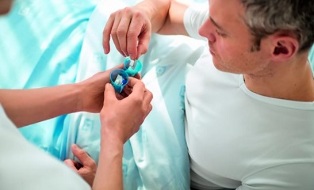
Representatives of stronger sex in adulthood often suffer from genitourinary diseases. The causes of unpleasant symptoms are very different, so choosing male prostatitis drugs alone can be dangerous.
Inflammatory diseases require comprehensive methods and diagnostic studies to prescribe the correct treatment.
Prostatitis and its manifestations
Prostatitis is one of the most common diseases among men. After the age of 40, almost every fifth man will develop prostatitis. The disease causes many inconveniences and does not allow men to lead a full life. The appearance of the disease is caused by alcoholism, a sedentary lifestyle, malnutrition or improper sexual behavior.The main manifestations of the disease are:
- Severe pulling pain in the lower abdomen.
- Destruction of the excretory system.
- Often urged to urinate, especially at night.
- Discomfort or pain during intercourse.
- Erectile dysfunction or temporary impotence.
- Foreign body (blood or pus) in the urine.
Prostate problems suddenly appear or develop within a short period of time (usually within a week). Unwilling to go to an expert, many men look for drugs suitable for prostatitis without a doctor's recommendation. Pharmacies today offer a wide variety of medicines, and in most cases, they can be sold without a prescription (except antibiotics). When looking for the right medicine, it should be remembered that improper treatment or failure to seek medical help in time can lead to complications of the disease. As a result, prostate adenoma, cancer, infertility and impotence are easy to develop.
Main treatment methods
Modern pharmacology provides a variety of drugs in the fight against prostatitis. Their composition, release form and use scheme are all different. After the patient has been diagnosed and checked, the expert will prescribe drugs for the treatment of chronic prostatitis or the acute phase. You will need to have blood tests, urine tests, and ultrasound tests.
In the initial stages of the disease, when the cause of the inflammatory process has not been determined, a broad-spectrum drug should be prescribed. After receiving the test results, adjust the treatment method and change the antibiotics to more specialized drugs.
What is the best medicine for treating prostatitis? Experts will help you choose medicines, focusing on the type of disease.
Some examples of common treatment options:
- The acute phase of infectious prostatitis (caused by Escherichia coli, Klebsiella, Enterococcus, Pseudomonas). In this case, a prescription for cephalosporins or tetracycline antibiotics is required. To relieve the symptoms, analgesics and topical suppositories are used. The comprehensive treatment lasted 2 weeks.
- Chronic form. According to a certain regimen, prescription drugs in the form of suppositories or capsules for prostatitis. Antibiotics only worsen the disease, and only phytoremediation is performed during the remission phase.
- Potential prostatitis. Antibacterial therapy was prescribed for 14 days, as well as suppositories that have a local effect on the inflammatory process. If the disease does not cause you inconvenience, you do not need antispasmodic and painkillers.
- Non-infectious prostatitis. Medications to normalize the flow of urine, and antispasmodics to eliminate spasms and edema of the urethra. Analgesics can relieve pain syndrome. The course of treatment is 14 days.
The main drugs used by urologists to treat prostatitis:
- Antibiotics.
- Non-steroidal drugs.
- Painkiller.
- Immunomodulator.
- Homeopathy and herbal medicine.
The doctor immediately prescribes several pills, or adds candles with the desired characteristics to the injection. It is a comprehensive method (using drugs with different effects) that allows you to obtain good results and effectively cope with the disease. Some medications need to be taken before the symptoms disappear, while others need to be taken completely. All doctors’ recommendations must be strictly followed, and established treatment plans must not be violated.
Antibacterial drugs

Antibiotics can inhibit any inflammatory process in the body. Prostatitis caused by infection is no exception. After receiving the test results, visually inspecting, palpating the prostate and questioning the patient, the expert prescribed a series of antibacterial drugs.
Choose the appropriate group according to the type of disease:
- Fluoroquinolol.It is used to treat diseases that have developed into chronic diseases and severe stages. These drugs are effective and have almost no side effects. They can quickly relieve inflammation and inhibit the growth of pathogenic bacteria.
- Tetracycline.Used to treat the acute phase of the disease. The main contraindications for use are leukopenia and renal pathology, which is a possible manifestation of allergic reactions.
- Penicillin.may cause undesirable side effects such as drowsiness, dermatitis, drowsiness, tinnitus and headache. Therefore, it should be used with caution in people with chronic kidney and liver diseases.
Modern medicines quickly begin to act on the problem area, allowing you to deal with the inflammatory process within a few days. The urologist took into account the patient's health, the nature of the disease and age, and prescribed antibiotics to prevent prostatitis. The expert takes into account the grades of time-tested drugs and the latest developments in the market.
Non-steroidal drugs
Anti-inflammatory drugs used to treat prostatitis can quickly relieve groin pain, reduce inflammation and significantly relieve the condition. After taking it for a few hours, the patient immediately noticed pain, discomfort and urination back to normal. Non-steroidal anti-inflammatory drugs can reduce muscle tone in the groin area, thereby improving health.
Many patients notice that their condition has improved. They neglect to take other medications and not just aggravate the condition. It should be understood that this medicine is taken in combination with antibiotics and other means.
Alpha blocker for pain relief
Medications in this category are prescribed to relax muscles and improve the flow of urine. Regardless of the form of the disease (acute phase, chronic phase), these drugs exist in almost any treatment plan. It should be remembered that the drug itself is no longer aimed at treatment, but only prevents and eliminates the main discomfort that does not allow people to live a normal life.
Immunomodulators, support the human body
In acute or chronic forms of prostatitis, there are no drugs that can enhance the body's defenses. Regulators can affect cellular and humoral immunity, and help the body fight infections, improve overall skin tone, and normalize many processes.
The drugs in this group are used in combination with other drugs and have an effect within the first few hours after administration.
Homeopathy and herbal medicine
Herbal medicine or homeopathy is as popular as any other type of medicine. They are safe for the body and equally effective.
The medicine is provided in the form of suppositories or tablets. They are sold for free and do not require a doctor's prescription. Before taking it, please read the instructions carefully and follow the recommended dosage.
Prostatitis Drug Form

All drugs provided by pharmacies have different release forms. Not everyone knows the peculiarities of choosing one or another species. It is more convenient to drink tablets, but injections work faster and allow sufficient concentrations of active substances to reach the site of inflammation faster.
Experts most commonly prescribe the following drugs:
- injections.One of the best treatments, although there will be quite unpleasant feelings during the injection. Any treatment plan for prostatitis almost always starts with injections.
- Rectal candles.Due to its local effect, this drug can quickly relieve pain, relieve inflammation and activate blood flow. Anti-prostatitis suppositories can be used together with antibiotics and also contain non-steroidal anti-inflammatory drugs or anesthetics.
- Pills.Use the most convenient form because it is quickly accepted. But the process of passing the medicine into the bloodstream through the stomach is worse, and its effect may be different from other forms of medicine.
Choose the doctor's treatment method and drug release form according to the patient's overall condition and whether a certain effect is needed. If the choice of therapy is incorrect or the patient does not follow the established admission schedule and treatment plan, prostatitis will become a chronic disease. This form of disease is more difficult to treat and can lead to serious consequences. Therefore, in case of prostate problems, you should not take the medicine yourself. Instead, you should immediately contact a competent expert who will take into account all the characteristics of the human body and prescribe the correct treatment.

























